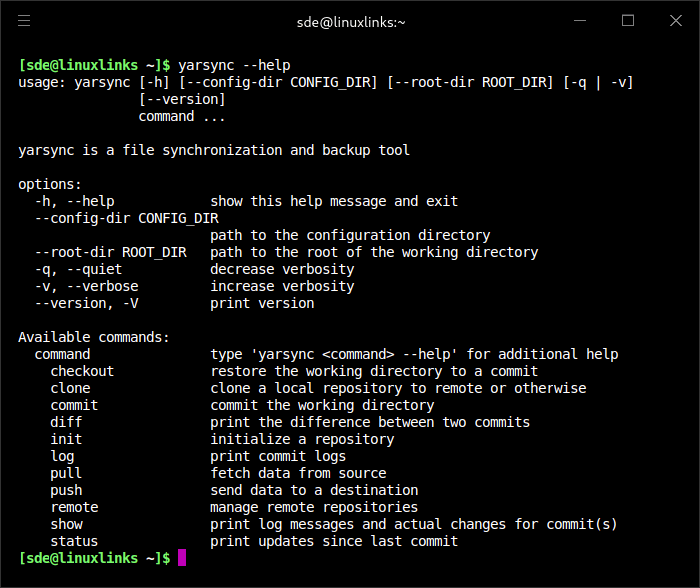Yet Another Rsync is a file synchronization and backup tool with the interface similar to git.
It can be used to synchronize data between different hosts or locally (for example, to a backup drive). It provides a familiar git command interface while working with files.
YARsync can be used to manage hierarchies of unchanging files, such as music, books, articles, photographs, etc. Its final goal is to have the same state of files across different computers. It also allows to store backup copies of data and easily copy, update or recover that.
It is a Python wrapper (available for Python>=3.6) around rsync and requires a file system with hard links.
This is free and open source software.
Features include:
- Distributed – no central host or repository. If different replicas diverge, the program assists the user to merge the repositories manually. Several replicas of the repository can diverge, and in that case a manual merge is supported.
- Efficient – only run on user demand, and does not consume system resources constantly. Already transferred files are not transmitted again. This allows the user to rename or move files or whole directories without any costs, driving constant improvements on the repository.
- Non-intrusive – does nothing to user data. It has no complicated packing or unpacking. All user data and program configuration are stored as usual files in the file system. If one decides to stop using the software, they can simply remove the configuration directory at any time.
- Simple – does not implement complicated file transfer algorithms, but uses an existing, widely accepted and tested tool for that. User configuration is stored in simple text files, and repository snapshots are usual directories, which can be modified, copied or browsed from a file manager
- Safe – preserves user data. It always allows one to see what will be done before any actual modifications (–dry-run). It is its advantage compared to continuous synchronization tools, that may be dangerous if local repository gets corrupt (e.g. encrypted by a trojan). Removed files are stored in older commits (until the user explicitly removes those).
Website: github.com/ynikitenko/yarsync
Support:
Developer: Yaroslav Nikitenko
License: GNU General Public License v3.0

YARsync is written in Python. Learn Python with our recommended free books and free tutorials.
Return to File Synchronization Tools
| Popular series | |
|---|---|
| The largest compilation of the best free and open source software in the universe. Each article is supplied with a legendary ratings chart helping you to make informed decisions. | |
| Hundreds of in-depth reviews offering our unbiased and expert opinion on software. We offer helpful and impartial information. | |
| The Big List of Active Linux Distros is a large compilation of actively developed Linux distributions. | |
| Replace proprietary software with open source alternatives: Google, Microsoft, Apple, Adobe, IBM, Autodesk, Oracle, Atlassian, Corel, Cisco, Intuit, and SAS. | |
| Awesome Free Linux Games Tools showcases a series of tools that making gaming on Linux a more pleasurable experience. This is a new series. | |
| Machine Learning explores practical applications of machine learning and deep learning from a Linux perspective. We've written reviews of more than 40 self-hosted apps. All are free and open source. | |
| New to Linux? Read our Linux for Starters series. We start right at the basics and teach you everything you need to know to get started with Linux. | |
| Alternatives to popular CLI tools showcases essential tools that are modern replacements for core Linux utilities. | |
| Essential Linux system tools focuses on small, indispensable utilities, useful for system administrators as well as regular users. | |
| Linux utilities to maximise your productivity. Small, indispensable tools, useful for anyone running a Linux machine. | |
| Surveys popular streaming services from a Linux perspective: Amazon Music Unlimited, Myuzi, Spotify, Deezer, Tidal. | |
| Saving Money with Linux looks at how you can reduce your energy bills running Linux. | |
| Home computers became commonplace in the 1980s. Emulate home computers including the Commodore 64, Amiga, Atari ST, ZX81, Amstrad CPC, and ZX Spectrum. | |
| Now and Then examines how promising open source software fared over the years. It can be a bumpy ride. | |
| Linux at Home looks at a range of home activities where Linux can play its part, making the most of our time at home, keeping active and engaged. | |
| Linux Candy reveals the lighter side of Linux. Have some fun and escape from the daily drudgery. | |
| Getting Started with Docker helps you master Docker, a set of platform as a service products that delivers software in packages called containers. | |
| Best Free Android Apps. We showcase free Android apps that are definitely worth downloading. There's a strict eligibility criteria for inclusion in this series. | |
| These best free books accelerate your learning of every programming language. Learn a new language today! | |
| These free tutorials offer the perfect tonic to our free programming books series. | |
| Linux Around The World showcases usergroups that are relevant to Linux enthusiasts. Great ways to meet up with fellow enthusiasts. | |
| Stars and Stripes is an occasional series looking at the impact of Linux in the USA. | |
